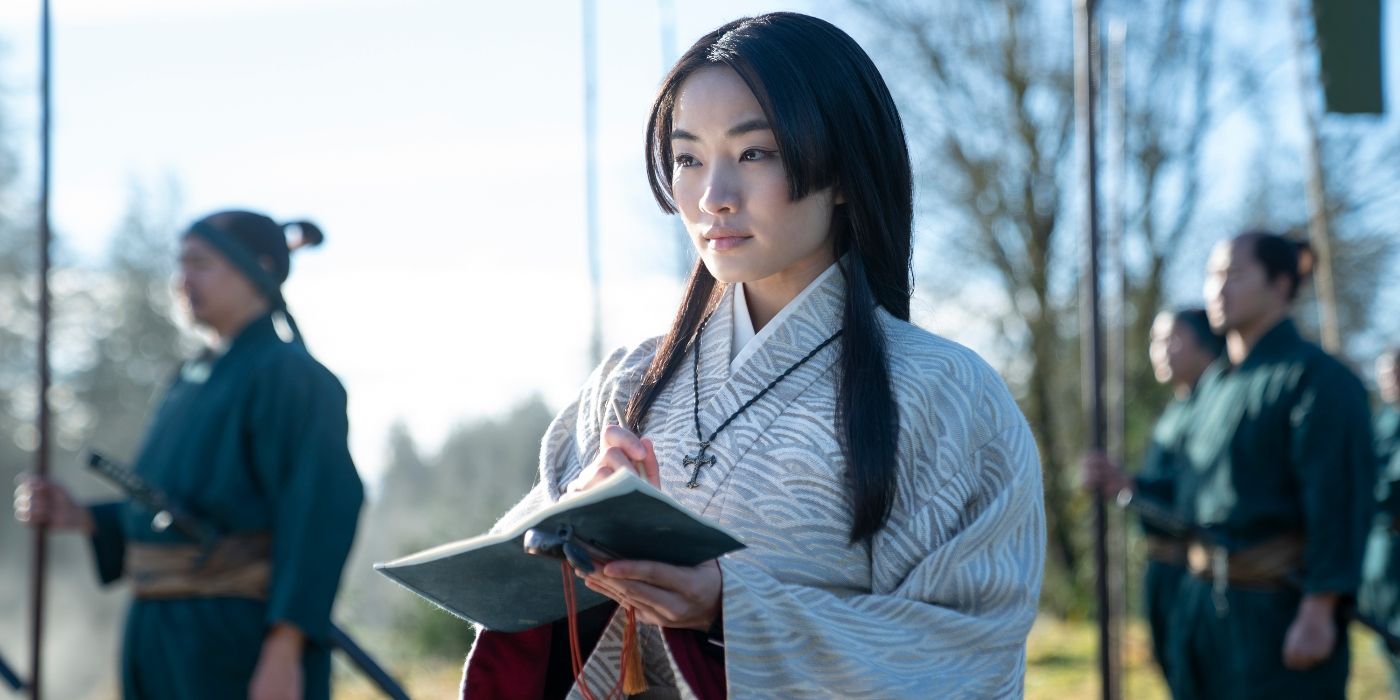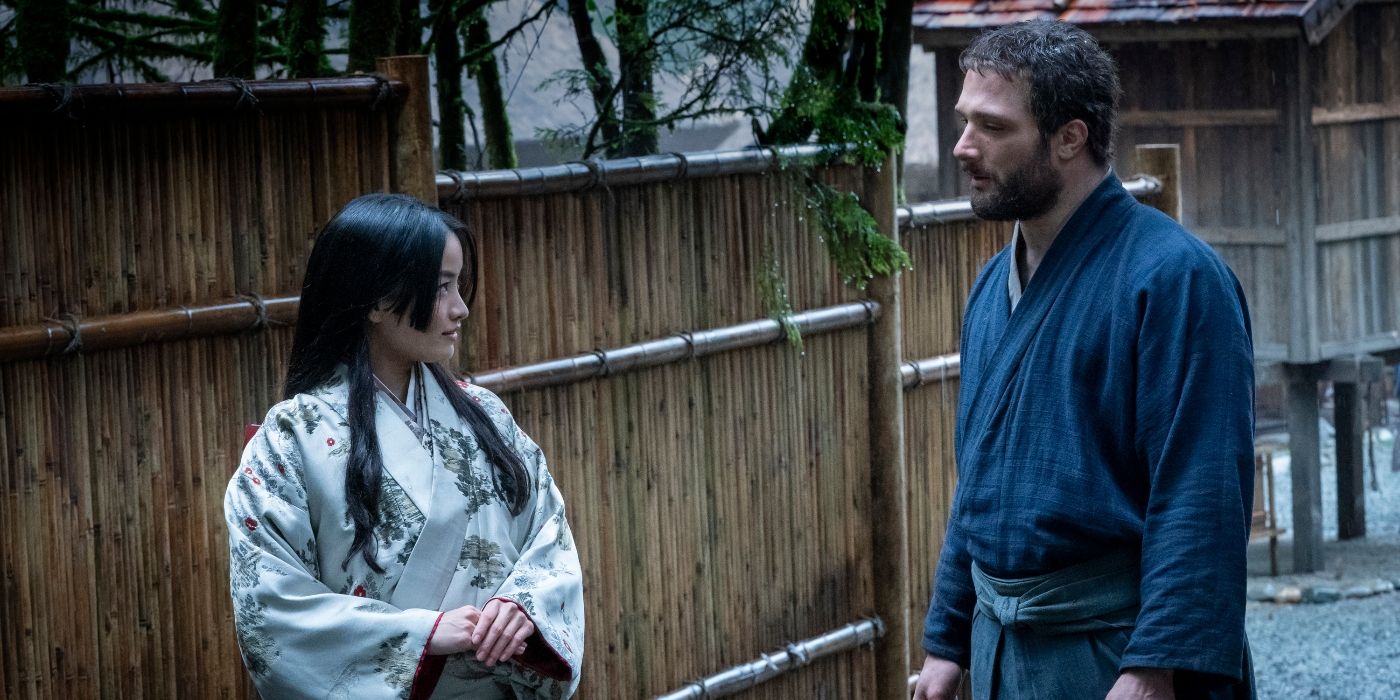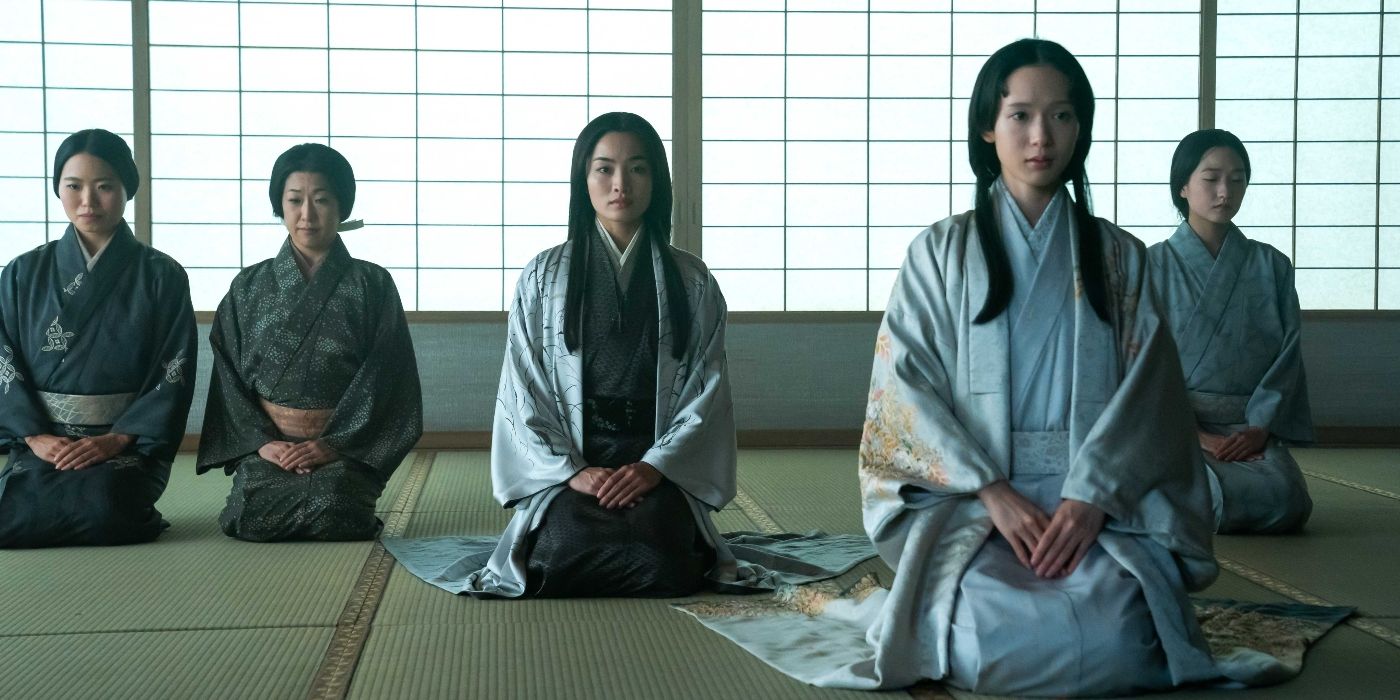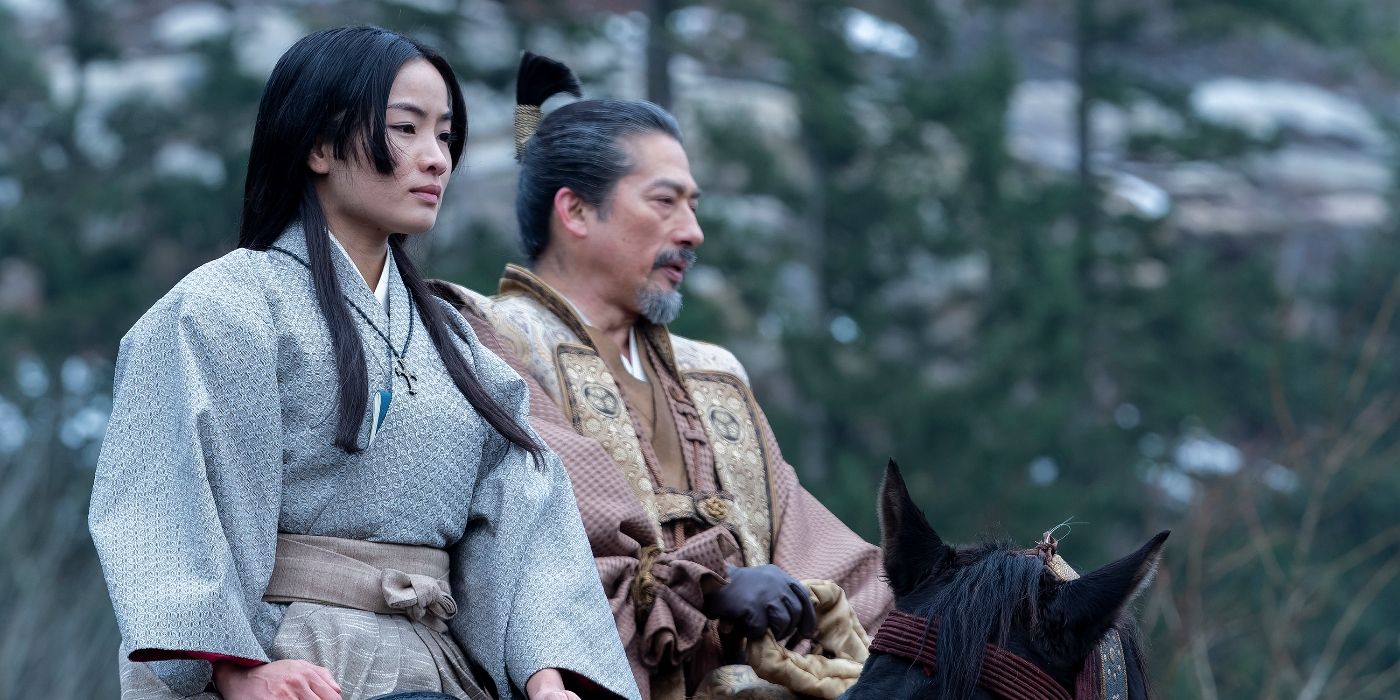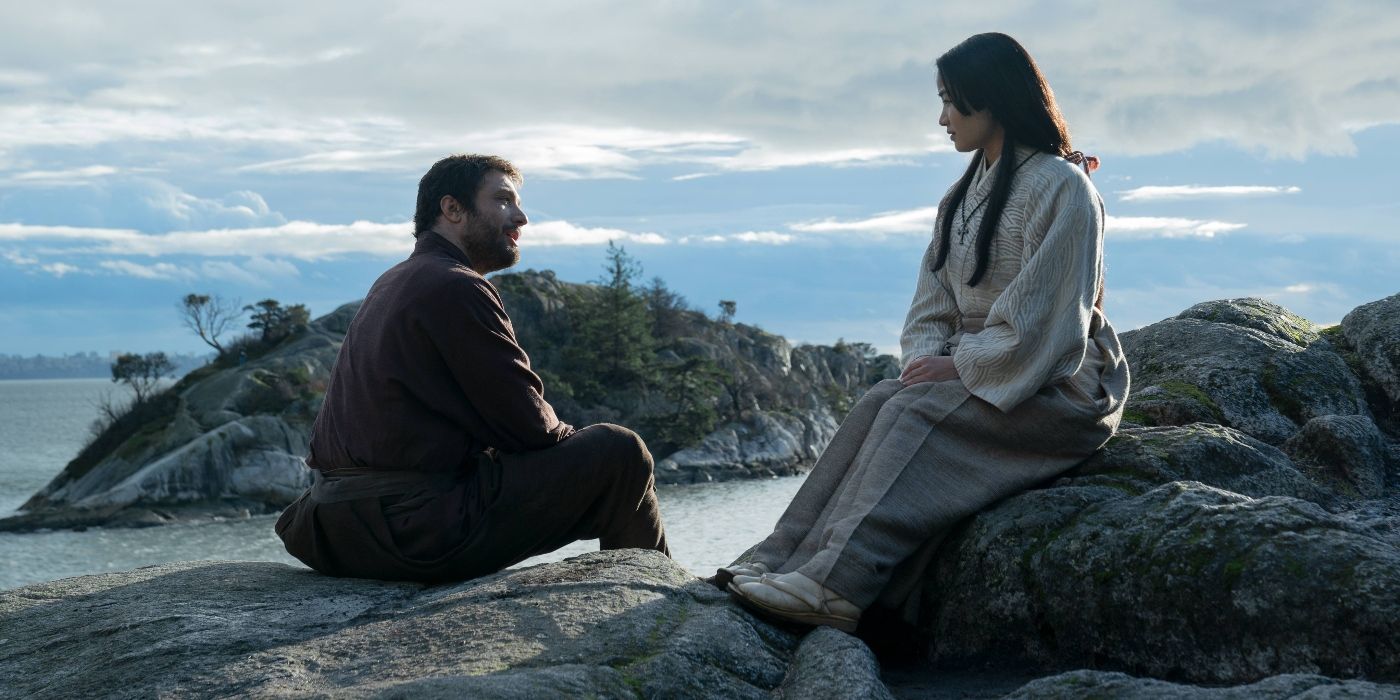It’s a tale of family and loss.
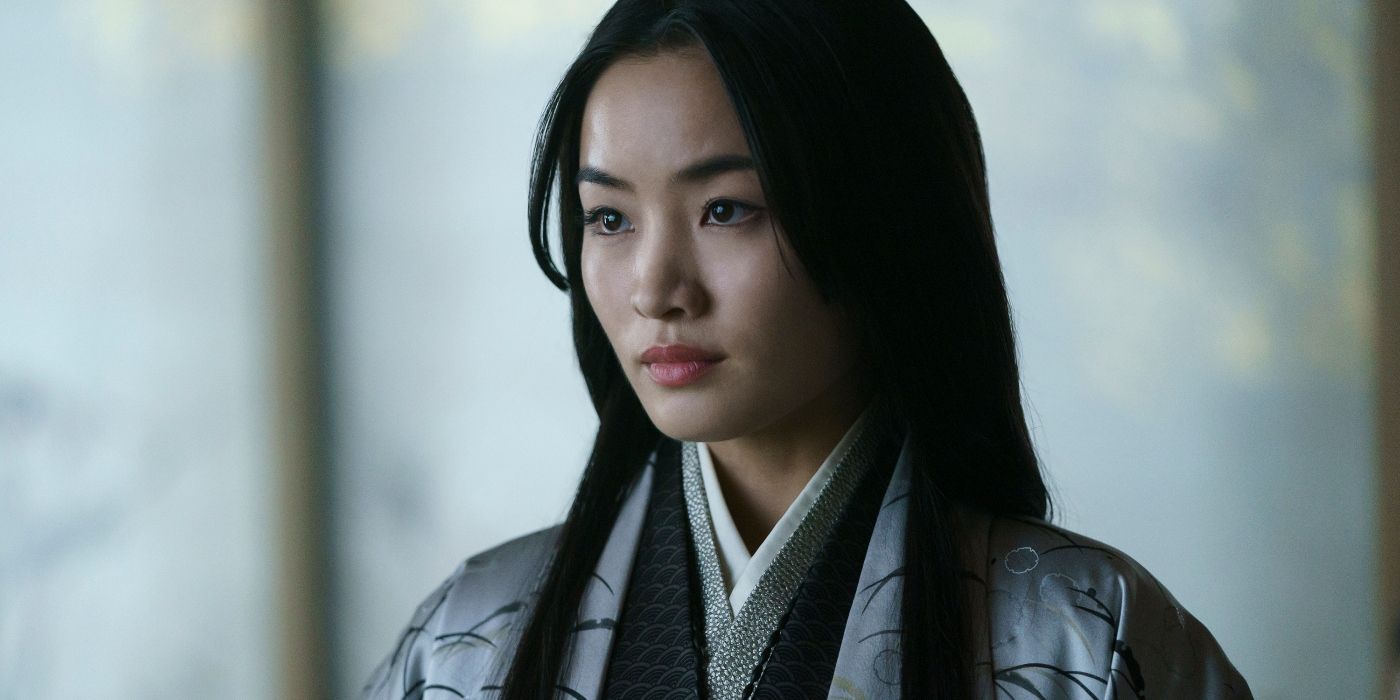
This week’s episode of Shōgun, “Broken to the Fist,” gives the audience a break from the gory bloodshed, but is still packed with tension and the deadly consequences of thoughtless acts. The return of Toda Buntaro (Shinnosuke Abe) after his apparent sacrifice earlier in the season, leaves his wife, Lady Toda Mariko (Anna Sawai), distraught, and things get even worse when Lord Yoshii Toranaga (Hiroyuki Sanada) orders him to join her living in John Blackthorne’s (Cosmo Jarvis) house in Ajiro. Later, during a very uncomfortable dinner, Buntaro orders Mariko to reveal her family history to Blackthorne, and the tale is an extremely tragic one.
Mariko Tells the Tragic Story of Her Family in ‘Shōgun’
After Buntaro almost kills Mariko to prove that he can keep up with Blackthorne’s drinking, the latter scolds him for not treating his lady with courtesy. Buntaro then scoffs at Blackthorne and orders Mariko to tell the story of her family, something that has only been shown in brief flashbacks up until this point in the series. Mariko follows her husband’s command, but is shaken and holds back tears while telling it, even though Blackthorne tells her she doesn’t need to do it and can simply come up with a fake story. What follows is a tragic tale of family and loss.
Mariko explains that she is the daughter of Lord Akechi Jinsai, a nobleman who was a vassal of Kuroda-sama, the man who ruled Japan before the Taikō Nakamura Hidetoshi (Yukijiro Hotaru). She describes Kuroda-sama as being “corrupt and murderous,” which led Lord Jinsai to conspire and kill him “out of love for the realm” as a way of protecting Japan from a cruel ruler. Still, regardless of his intentions, what Lord Jinsai did was an unforgivable crime, and he was hunted along with all the members of the Akechi clan — all of Mariko’s brothers and sisters and her mother. Lord Jinsai was then forced to execute each one of them, and only then was he allowed to commit seppuku. Mariko herself, however, was spared as she had just gotten married, and thus belonged to another man, not being Lord Jinsai’s to kill.
Every year that follows, on the anniversary of her family’s death, Mariko asks Buntaro for permission to commit seppuku, but he denies her, ordering her to keep living instead. For her, this is a tragedy in itself, as she is now the last living member of a clan that’s seen as traitorous. Her words make it clear, however, that she doesn’t see what her father did as inherently bad, given his intentions. She also describes what happened to her family as “murder,” meaning she believes their deaths weren’t warranted. Perhaps honor demanded Lord Jinsai to die for what he did, but not necessarily all the family. When she finishes the story, she asks Blackthorne to remember the Eightfold Fence, the only place where she can get peace of mind from the constant abuse she faces from her husband.
Mariko’s story is very similar to that of her real-life counterpart, Hosokawa Gracia. Gracia was part of a clan that betrayed and caused the death of Oda Nobunaga, one of Japan’s Great Unifiers, and escaped death because she was already married, too. Alone and forced to live as a prisoner in Osaka, Gracia turned to Christianity, which was frowned upon by her husband, Hosokawa Tadaoki, with whom she also had a tumultuous relationship, but her rebellious temper would often keep him in check.
Buntaro and Mariko Have a Dysfunctional Relationship on ‘Shōgun’
In the first episode of Shōgun, Lady Usami Fuji’s (Moeka Hoshi) husband, Usami Tadayoshi (Yuki Takao), not only commits seppuku after merely interrupting a meeting of the Council of Regents, but also kills the couple’s infant son to end his bloodline. This is a testament of how serious of a consequence committing seppuku is, and how dire the punishment can be for some crimes. For Mariko, seppuku is an honorable way to die, while also protesting the injustice that was done against her family. After seeing her entire family get killed for the crimes of just one of its members, for Mariko to keep living is worse punishment than death — and forbidding her such relief is cruel in proportion.
When Buntaro orders Mariko to tell her family’s story, he has just barely avoided hitting her with two arrows to the face, something that would be extremely problematic regardless of any rule of marriage in Japan. But he adds insult to injury when he orders her to talk about her family and describes them as a “disgusting, filthy line,” deliberately belittling her and her family. It is clear from the beginning of the series that they don’t have a healthy relationship, which gets worse once Lord Toranaga starts using Mariko as his translator to deal with Blackthorne. Later, when Buntaro stays behind to buy time for Lord Toranaga and his entourage to flee from Osaka, Mariko seems almost relieved to see him be left behind, just as she seems distraught when he returns.
An extremely cruel and prejudiced person, Buntaro sees Mariko’s troubled past as the perfect excuse to treat her so poorly, and his return means that she will have to submit to his vicious behavior again, reentering the spiral of abuse that truly characterizes their relationship. After the dinner scene, he viciously hits her when they are alone, something that has surely happened countless times before. The stain on her family name is, by extension, a stain on his own name, and blaming her for it is the easy way out, since the crimes of her father are, by extension, her own.
Toranaga’s Service Is the Only Place Mariko Has Dignity on ‘Shōgun’
By being forced to live, Mariko’s life lacks the dignity she had before her father killed Kuroda-sama. It’s an existence without honor, and carrying the name of a clan that’s seen with contempt. There are only three people who treat her with respect: Blackthorne, Fuji, and Toranaga. Being in the latter’s service is also the only way for her other than seppuku to keep her dignity. Although Buntaro is clearly opposed to Mariko working as Toranaga’s translator, her service brings honor to her and her family, something that takes away some of Buntaro’s control over her.
This is only possible because of Toranaga’s straightforward nature. As one of the Lords appointed to the Council of Regents by the Taikō, Toranaga faces constant threats and urgent issues to deal with, requiring loyal people by his side. His use of Mariko is based on her being someone who is quietly and patiently working her way up to restoring her dignity. She is the only one close to him with the required language tools for the job, but she’s also eager to show that she is more than people give her credit for.
As someone in Lord Toranaga’s service, Mariko’s position isn’t very different from Fuji’s. After she lost her husband and son, she was also ordered to keep living, and serving Lord Toranaga gave her a purpose and a place to be. While being Blackthorne’s consort may not have been what she expected, it’s still her duty, so she accepts it. For Mariko, serving Toranaga as a translator is also a purpose, seeing as she faces nothing but abuse from her husband and has no family left. For Toranaga, this means not only getting a faithful translator but also taking care of those in his service.
Shōgun is streaming on Hulu in the U.S. New episodes are released weekly on Tuesdays.
